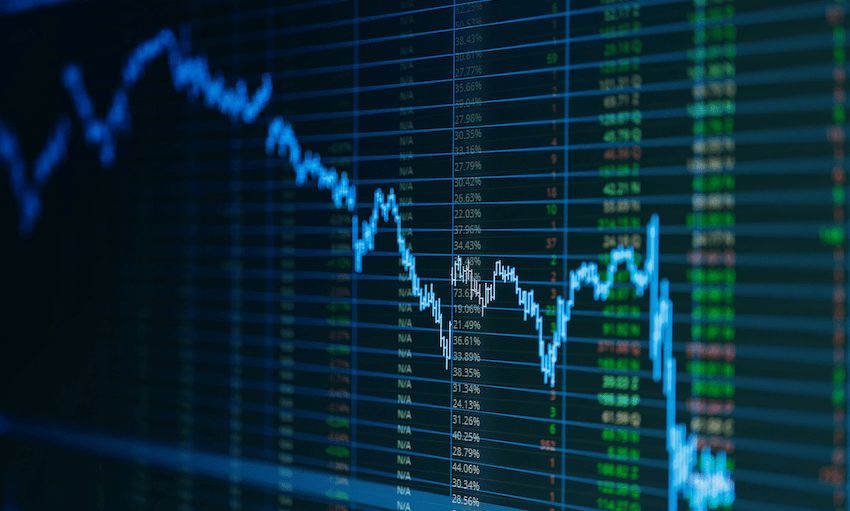Financial markets around the world have been jumpy this week, with fears around the coronavirus putting them on edge. What does it mean for New Zealand?
US Stocks Plummet Amid Oil Fears.
Wall Street Plunges in Worst Drop Since 2008.
Sharemarket Recovers From Sharp Losses.
Bold headlines have dominated the business news over the past few days. To anyone who isn’t a direct investor in the US stock market, it can all seem a little vague and distant. But the interconnection of global economics means these developments can and will affect us, in both obvious and subtle ways. Here’s how it all fits together.
What happened with the stock markets on Monday?
The Dow dropped 5%. If you’re like me when I was a teenager, you might have asked, ‘Who’s Dow?’
The Dow Jones is a stock market index which sums up the performance of 30 large companies listed on American stock exchanges. The Dow’s performance, along with the other big indexes are useful indicators of how investors in companies are feeling; if the index is up then they’re confident, if it’s down then they’re nervous.
Before Monday, investors were already uncertain about the outlook for tourism, air travel and trade, all of which had decreased significantly globally since covid-19 started spreading across the world. But they completely freaked out after Saudi Arabia and Russia launched a price war, causing the price of oil futures to drop by the largest percentage in a single day since 1991.
This might seem like a good thing; the price of oil goes down which means more money in people’s pockets and cheaper fuel for businesses. The reason it caused waves of fear in this case is because the United States is a massive oil producer. If the global price of oil goes down, many American oil companies which produce a costly type of oil called shale won’t be able to compete and might go under.
This led to investors sensing trouble, selling off their shares and reinvesting their money in safe havens, often gold and government bonds, which tend to hold their value. The frenzy was so severe that trading was automatically suspended for 15 minutes, to let everyone catch their breath.
What about New Zealand’s market?
Fear is contagious, probably more so than coronavirus. So when American share prices started tanking, it triggered fear and uncertainty across the world, too. That’s basically what happened here with the NZX50, New Zealand’s biggest stock index, which plummeted on Tuesday morning after investors saw what had happened in the US.
However, in large part because we don’t have the same oil shares here, the reaction on Tuesday wasn’t as severe and the NZX50 only dropped 3%. It has since climbed back up a bit on the strong performance of Asian financial markets.
What are the real world impacts?
The real world impacts from these stock market fluctuations are harder to quantify in the long term. While a recession, both in New Zealand and abroad is possible, it usually depends on just how deeply fear and uncertainly permeate global economies and just how capably governments and central banks handle the disturbances.
In the New York Times James B Stewart wrote that while a falling stock market isn’t likely to trigger a recession, it can expose other fundamental weaknesses, like those that caused the 2008 GFC.
“It didn’t cause the financial crisis, but it did help expose the excesses of the mortgage-backed securities market and inflated real estate prices, which in turn led to the collapse of Lehman Brothers and a worldwide recession,” he wrote.
“There’s no reason to believe that anything of that magnitude is lurking within the financial system today. But no one can be sure until the financial plumbing comes under pressure.”
In New Zealand the financial plumbing seems robust and the government has a range of fiscal tools to help businesses in the tourism, seafood and education sectors that are already struggling under coronavirus measures. According to economist Cameron Bagrie, New Zealand government is in a good position to intervene before things start to get ugly.
“It’s not all glass half empty, we’re entering into a period of heightened uncertainty in pretty good shape,” he told The Spinoff.
“Being employed is the biggest consequence, and that is why the government response in regard to offering wage subsidies to try to keep people employed is critically important.”
Although investors here and abroad are still very uncertain, Bagrie said confidence has improved somewhat on the hope that markets might see some sort of rescue package from global policy makers. However he conceded that the global economy will still face a tough 12 months.
How’s the super fund doing?
Today on RNZ’s Morning Report, Matt Whineray, the chief executive of the New Zealand super fund, announced it had dropped $5b, like it was no big deal. This is because the Super Fund – the big pool of money that will be paid out to baby boomers when they retire – is a long-term growth investment, it’s not the end of the world and will recover over time.
“As a long time investor we chose a risk level. We know that we are going to get times like this… There is no doubt this is a massive disruption, however we can look through this as a long term investor,” Whineray said
Should you be worried about your Kiwisaver?
You may have checked your Kiwisaver balance in the last few days and noticed that it’s looking a tad unhealthy. That’s to be expected, considering that it’s probably invested in many of the funds have fluctuated in the past few days.
It’s no reason to panic however. Like the Superfund, Kiwisaver is long term investment and it’s confidently expected it will rebound over time.
As Whineray also said on Morning Report. “Don’t look at your Kiwisaver balance. Keep the money flowing.”
